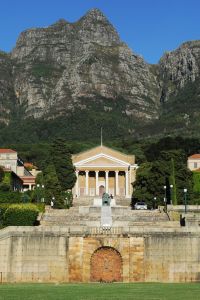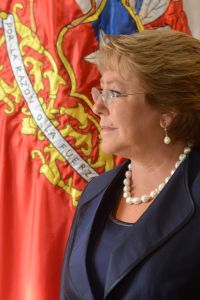Chilean President Michelle Bachelet concluded her two-day visit to Cape Town engaging in what was, at times, a deeply moving and, at others, rousing discussion about gender-based violence and women’s rights.
President Michelle Bachelet
The event at the University of Cape Town’s Jameson Hall took place the day after she delivered the Nelson Mandela Annual Lecture in the Cape Town City Hall. The Gender in Dialogue event formed part of the 12th Nelson Mandela Annual Lecture Series, in partnership with the African Gender Institute and UCT.
“What is that we are doing wrong? What is that we haven’t addressed? I don’t have the answers, otherwise I would win the Nobel Prize, but I have some ideas …” she said as she joined the debate after an early-morning visit to Robben Island.
Bachelet, who was head of UN Women prior to her re-election as President of Chile earlier this year, is well known for her campaigns for women’s rights Her government has redirected tax revenue for social reforms that include pensions and social protection programmes for women and children, and early child care centres for low-income families.
Former First Lady and social activist Graça Machel, hosted the event in her capacity as chancellor of UCT. Sharing the platform with Bachelet were Mbuyiselo Botha of Sonke Gender Justice, Nomboniso Gasa, feminist activist, writer and researcher, and filmmaker and gender activist Zethu Matebeni.
Jane Bennett and Yaliwe Clarke
Prior to her arrival, Jane Bennett, head of UCT’s Gender Institute, and gender lecturer Yaliwe Clarke, invited members of the audience to start the discussion. Some contributions were at policy level, while others were deeply personal as women stood up to talk about their experiences of abuse.
A UCT student spoke about the abduction, rape and murder of her sister in a township in 2010, the battle to get the police there and to even start looking for her. Yet, in Rondebosch, where the student now lives, the police patrolled every 20 minutes. In a breaking voice she spoke about how young black men were perceived.
“I see a young black man in a hoodie on the corner. Why am I scared of a black face when I am black myself?”
A gender activist who had been raped repeatedly by her father and grandfather over a 19-year-period said people could be healed of the trauma of abuse. She has worked tirelessly with young people who had been abused and could see their healing.
Another woman reminded the audience that one in three South African women would be raped in her lifetime, and one in six boys would be raped and sodomised.
President Bachelet smiles during the dialogue
In her opening address, Bachelet said: “To be honest I don’t think we need to empower women, because women are powerful.” But she added that there was no “one-size- fits-all” solution to the problems facing women around the world.
“Poverty has a female face,” she said, citing statistics that showed the gap between the developed world and sub-Saharan Africa, urging that everybody had to do better on gender issues, even developed countries.
In some instances, government had the legal framework but no money for implementation; in others, they might have the budget but not the political will.
In her concluding remarks at the end of the dialogue, she picked up on a quote from Nelson Mandela about the need for a “burning patience”. She said this did not mean that gender activists needed to be patient or stop their outrage, but that they needed to stay the course and continue to fight for change.
UCT vice-chancellor Dr Max Price welcomed the gathering and pointed out that their goal for event was in sync with the university’s mission.
Dr Max Price welcomes the panellists, (from Mbuyiselo Botha, Nomboniso Gasa, Zethu Matebeni and President Michelle Bachelet. In the background are Jane Bennett and Yaliwe Clarke
He said: “As an institution of higher education, and especially as a research institution that focuses on bringing positive change to South Africa and other parts of the developing world, UCT has a particular interest in hosting a dialogue around gender dynamics and transformation.”
Here is a synopsis of the views expressed by the panellists:
Mrs Graça Machel (UCT chancellor and Nelson Mandela’s widow)
Mrs Graça Machel
Introducing President Bachelet, Machel said there were two challenges the “human family” was grappling with, and there was no clear path on how to solve them: “One is race. The second is gender.”
She said there seemed to be a mismatch between the sophisticated legal instruments and strong public institutions, and what happened in private.
“Maybe we have to question more deeply the private space … It strikes me that society is not outraged against violence. We seem to be very ‘it’s OK’.”
She said a long journey lay ahead for gender equality.
“We have to question seriously, and know clearly, that it will be tough transformation of the individual. It is not about institutions or the public debate of transformation of individuals. Men and women must plant the seeds of society where relationship between men and women are rooted in equality, and there is an acceptance of one another.
“It took us many decades to get freedom, and freedom of spirit. In this case, it will take a long, long time,” she said.
Nomboniso Gasa (feminist, activist and writer)
Nomboniso Gasa
Gasa grasped the nettle with her comments on the interface between African identity and tribalism, and what this meant for freedom and gender rights, referencing a position put forward by Mrs Machel in which she had questioned whether there had been too much emphasis on the need “for the tribe to die in order for the nation to survive”.
However, Gasa’s view was that the biggest obstacle was the failure to have a “daring imagination”, the failure “to say to our president, and I’m being very controversial here, if that is your definition of African-ness, then keep it to yourself. Don’t speak for me.
“Representative democracy is no longer enough. It never was enough. People want more from their government than just representative democracy,” she said.
Myubiselo Botha (Sonke Gender Justice)
Mbuyiselo Botha
Botha spoke about the gender debate from a male perspective, saying: “The elephant in the room is the role of men.”
“How, with the programmes that you so wonderfully pursue, do we ensure that men are at the centre, not only as perpetrators but as the partners for change?” he asked. “How do we ensure that it becomes our daily discussion?”
He said at the heart of many acts of violence were boys who had grown up without fathers, citing a recent case of seven boys who were involved in raping a disabled girl.
Zethu Matebeni (feminist, writer, thinker, filmmaker)
Zethu Matebeni
Zethu Matebeni received a standing ovation and moved many in the audience to tears with her powerful litany of recent acts of violence against women, transgendered people, gays and lesbians. The impact on their families was also devastating, she said.
She talked about her outrage that 60 years into the Women’s Charter, life for many women remained the same.
“We are outraged after so many years of the promise of freedom, that many women can’t claim their dignity … We are outraged by the violence happening on our bodies, our psyches, our spaces.”
She said history had shown that freedom came from taking risks.
“We continue this work. We continue this work of liberation until we all are free,” she said.
About the University of Cape Town
The University of Cape Town is the highest-ranking university in Africa, with more than 100 000 alumni. UCT is committed to producing graduates who are not only well-educated, but also mindful of the responsibilities of democratic citizenship. This is important as higher education in general has a duty to develop an educated and thoughtful citizenry, which is a critical element of a successful democracy. This is the basis upon which UCT makes its most profound contribution to the development and transformation of our society. UCT's reputation for excellence is underpinned by its distinctive research, led by its distinguished faculty, many of whom are world leaders in their respective fields.

